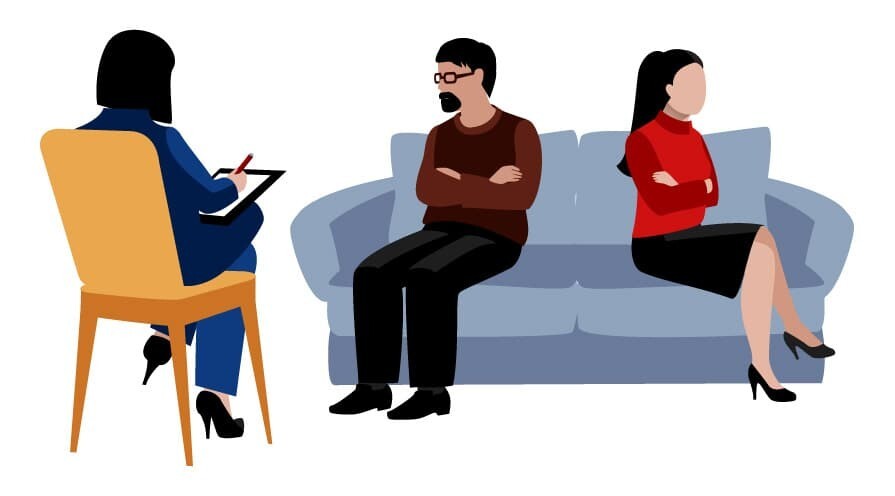Conflict is a part of any relationship. But when left without resolution, it tends to create more problems that will cause distance and misunderstanding between partners. A couple therapist plays a great role in guiding the couple through their conflicts, which will make them able to communicate well, and this makes a healthy environment for growth and resolution. We shall find out how a therapist supports the resolution of conflicts in relationships in the following article.
1. Identify the Root Causes of Conflict
One of the main functions of a therapist is the identification of why the conflict happens. Most of these issues arise from a lack of effective communication, unmet needs, or unresolved past life incidents. A therapist begins the process of communication to trace the cause and source of such conflicts and problems in order for the couples to become aware of their issues.
Technique of Therapist:
a) Open-ended questions to reflect on
b) Pattern and repetition
c) Explication of needs and feelings
2. Communication in Conflict Resolution
Miscommunication leads to conflict in a relationship. Therapists assist the couples in using some techniques on active listening and clear expression. When communication without blame occurs, couples venture into conflicts with sympathy and understanding.
Key Communication Techniques:
a) Active listening and repeating back what has been communicated
b) “I” statements as opposed to language that holds on to blame
c) Seeking clarification and confirmation for understanding
3. Teaching Conflict Resolution Skills
A therapist equips couples with practical tools for conflict negotiation and compromise. Some of these skills are negotiation, compromise, and establishing boundaries. It will enable couples to handle issues constructively and not escalate. In exercises guided by the therapist, each couple will be able to solve problems successfully.
Conflict Resolution Tools:
a) Problem-solving exercises toward teamwork
b) Boundary setting to protect emotional well-being
c) Practicing compromise for solutions that meet the needs of both sides
4. Managing Emotions During Conflict
Conflicts are often emotional, which may escalate the level of disagreement. Therapists work with such couples to identify and then manage their emotions, create a calm environment where either of them can express freely without feeling overwhelmed.
Effective Strategies for Emotional Management include:
a) Teaching mindfulness technique to ground
b) Identify triggers and respond calmly
c) Promote self-awareness as well as emotional expression
5. Rebuilding Trust and Intimacy
Conflicts can hurt trust and intimacy, especially if they are not resolved. A therapist can help a couple regain their trust by making them set realistic expectations, express gratitude, and share common goals to reaffirm commitment toward each other.
Steps in Restoring Trust
a) Shared Goals for the Future
b) Setting Consistent Actions in Trust-Building Behavior
6. Cultivate Empathy and Compassion
Therapists assert that empathy is the cornerstone of conflict resolution. Couples will be more merciful in handling conflicts once they can see things from one another’s perspective. A therapist allows each partner to walk in the other’s shoes and increases the emotional bond.
Empathy-Building Techniques:
a) Perspective-taking exercises to understand each other
b) Encouraging partners to share vulnerabilities
c) Affirming and validating each partner’s experiences
For more blogs: nciphabr
7. Creating a Safe Environment for Conflict Resolution
Therapists ensure that there is a safe and neutral environment where couples share their thoughts and feelings. This leads to honest communication and mutual respect between the couples, hence facing issues without judgment.
Role of Therapist in Safety:
a) Developing rules on respectful communication
b) Assistance in facilitating conversations so that each party has a chance to be heard
c) Providing constructive feedback to encourage good interaction
8. Assisting Couples to Recognize Growth Opportunities
Conflict can bring growth to a couple and also help the couple learn much about themselves and each other. Therapists advise couples to see conflicts as opportunities for personal and relational growth, always improving and increasing their understanding.
Growth Opportunities in Conflict:
a) Building strength and resilience
b) Learning how to prevent future conflicts
c) Celebrating small victories in fighting conflicts
For more blogs: nciphabr
Conclusion: Couple Therapist Services
The role of a therapist in couple therapy is more than resolving individual conflicts. Couples are given the necessary tools, skills, and insights by therapists to have healthy communication, trust, and empathy. A therapist is there to support long-lasting, positive changes that fortify relationships by guiding the couple through conflict resolution, so they can navigate challenges in the future together.




More Stories
The Importance of Early Detection: How Heart Specialists in Karachi Are Saving Lives
Prime Care on Demand: Exploring the Rise of Mobile Health Solutions
Acupuncture Therapy: A Natural Solution for Pain Relief